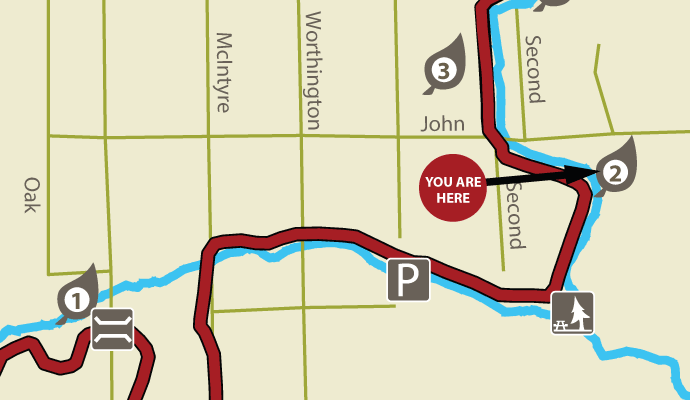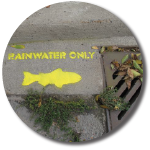"Oh no! Be careful what you pour on your driveway! Yucky stuff can flow into the Creek through a stormwater drain - like the pipe you can see coming out of the hill above us!"


Stormwater Runoff
Rain and melting snow runs off rooftops, yards, driveways, streets and parking lots. A small portion soaks into the ground, but most flows directly into stormwater drains or waterways like Chippewa Creek.
Stormwater carries with it everything it picks up along the way: pet poop, fertilizers, car oil, solvents, paint, antifreeze, garden chemicals and other hazardous household wastes as well as soil, seeds, leaves and grass clippings. It can impact water quality for plants, fish, animals and people. Debris such as plastic bags, six-pack rings, and bottles can wash into the Creek and choke, suffocate or disable ducks, fish, turtles and birds.
Stormwater runoff can also add to flooding and stream bank erosion, particularly during heavy rainfalls and the extreme weather being brought on by climate change.
To help reduce stormwater pollution from reaching Chippewa Creek, never put anything down a stormwater drain. Take your hazardous wastes to the City of North Bay Household Hazardous Waste Depot AND keep as much rain, melting snow and excess lawn or garden water as possible on your own property.

Manage Your Runoff
Here are some other ways you can help prevent stormwater from reaching Chippewa Creek:
- Do not connect your eavestroughs or sump pumps to the storm or sanitary sewers! This can overload the Sewage Treatment Plant, shortening the life of the plant and risking the dumping of untreated sewage into Lake Nipissing.
- Collect rainwater from roof-tops in mosquito-proof rain barrels. The water can be used later on your lawn or garden.
- Plant a rain garden. Specially designed areas with plants can provide natural places for rainwater to collect and soak into the ground. Rain from rooftop areas or paved areas can be diverted into rain gardens, trapping contaminants rather than flowing into storm drains.
- Replacing your concrete or asphalt? Consider using a permeable paving system that allows rain and snowmelt to soak through into the ground, reducing the water runoff.
- Clean up spilled brake fluid, oil, grease and antifreeze. Do not hose them into the street where they can eventually reach local streams and Chippewa Creek.
- Don't overwater your lawn. Consider using a soaker hose in your garden beds instead of a sprinkler.
- Compost or mulch yard waste. Don't leave it in the street or sweep it into storm drains or streams.

Stoop and Scoop Poop!
North Bay is a community of dog lovers and walkers. Pets make great companions and exercise buddies! Most of us stoop and scoop but the unsightly look and smell of fresh or decomposing animal waste not only puts a definite damper on a hike, walk or bike ride, it affects the health of Chippewa Creek.
Decaying pet waste consumes oxygen and sometimes releases ammonia. Low oxygen levels and ammonia can damage the health of fish and other aquatic life. Pet waste carries bacteria, viruses, and parasites that can threaten the health of humans and wildlife. Pet waste also contains nutrients that promote weed and algae growth.
Just one gram of pet waste contains an average of 23 million fecal coliform bacteria.
It makes sense to collect your pet waste in a compostable bag and toss it in the garbage when you’re out for a walk. It not only keeps the EcoPath clean for all of us to enjoy, it helps protect the health of Chippewa Creek.
And in the City of North Bay, it’s the law. (By-Law No. 2009-113 – Stoop & Scoop)
Please remember to keep your pet on a leash!



